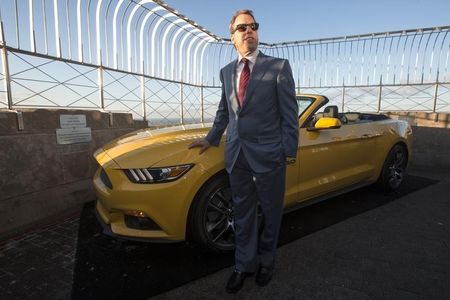By Ben Klayman
DETROIT (Reuters) - Ford Motor Co Executive Chairman Bill Ford said new technologies that allow cars to talk to each other and drive themselves may scare some people, so the industry will need to allow consumers to opt out of such features.
"A lot of this really cool technology ... kind of freaks some peopbill forle out," he said on Monday at an "intelligent transportation" conference here.
"Some people hear 'autonomous driving,' and say 'Oh my God, I never want to get into that vehicle,'" he added, referring to self-driving technology. "Other people say, 'I don't want my car talking to other cars. That's terrible.' We have to do this thoughtfully."
Ford said privacy issues will be important as connected and self-driving vehicles are developed to reduce traffic deaths and congestion. "We believe, at Ford, that opting in is important so people do have that comfort."
Automakers are racing to develop such features as cars that apply brakes automatically when they sense an impending collision or slow down because a vehicle ahead on the highway has warned that traffic has stopped. In addition, Internet search company Google Inc is developing the technology for a completely driverless car.
General Motors Co said on Sunday that it will introduce a car in 2016 that communicates with other vehicles and will also introduce a vehicle that incorporates semi-automated hands-free driving technology.
Bill Ford told the audience he saw an accident on Sunday in which a man who was texting while driving hit a tree. Some features will help avoid that situation, but most automakers have said a vehicle like Google's driverless car remains far off in the future.
"Right now, you have to have eyes on the road, hands on the wheel and it's going to be that way for a while," Ford said. "Even as we start putting in a lot of these features that will assist you, the driver still has to be vigilant and in control."
When the industry evolves to the point where Google's planned technology is feasible, it will not seem a big deal because these new features will have been added gradually over time, he said.
But the technologies are coming as world population grows and more people move to cities, Ford said. "You cannot shove two cars in every garage in Mumbai. In fact, it's preposterous."
The ultimate vision is all forms of transportation on a single network communicating with each other, he said. The industry has to collaborate to make it work, however, as you cannot have Ford vehicles talking only with other Fords.

He also said he thinks electric-powered cars are "probably the way to go," but an over-reliance on coal-fired plants to power pure electric cars and plug-in hybrid vehicles is not the ideal solution.
(Editing by Matthew Lewis)
2_800x533_L_1412602635.jpg)